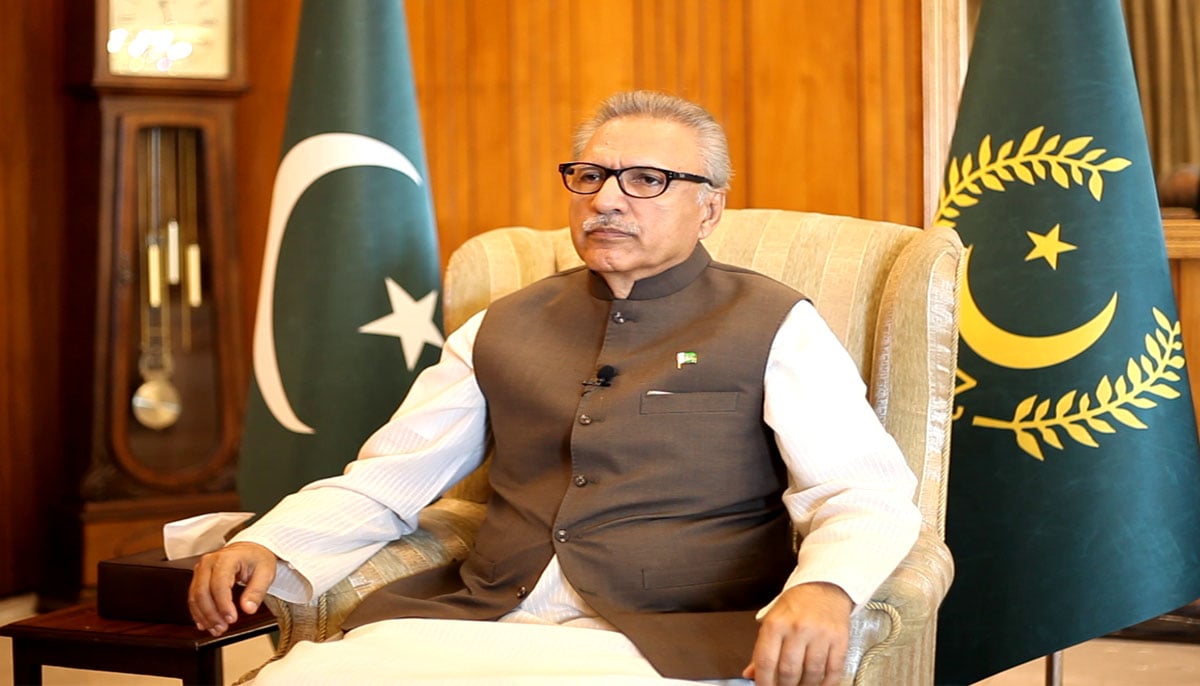
by Ali Khan Bangash 8 December 2023
President Arif Alvi of Pakistan finds himself treading cautiously in the labyrinth of geopolitical complexities as he reiterates his nation’s unwavering support for a “just and peaceful” resolution to the enduring Palestine issue. The recent controversy stemming from a statement hinting at a one-state solution has thrown a spotlight on Pakistan’s nuanced approach to a deeply entrenched problem.
The saga began with a telephonic conversation between President Alvi and his Palestinian counterpart Mahmoud Abbas on November 10. In a surprising turn, the President’s Office issued a statement suggesting that if Israel found the two-state solution unacceptable, then a one-state solution might be the only viable path. However, the statement was swiftly retracted, replaced by a more conventional one, sparking debates within Pakistan’s political corridors and beyond.
The aftermath rippled through the Senate, where caretaker Foreign Minister Jalil Abbas Jilani was compelled to clarify Pakistan’s position, revealing that the Foreign Ministry was not consulted before the initial press release. This misstep underscores the delicate nature of diplomatic relations and the need for cohesion in messaging, especially on sensitive matters like the Israeli-Palestinian conflict.
President Alvi, in his subsequent meetings with Imam Khatib at Masjid Al-Haram and Saudi officials, including Advisor Saleh bin Abdullah Humaid and Ambassador Nawaf bin Saeed Ahmad Al-Malkiy, sought to reaffirm Pakistan’s commitment to the two-state solution. These diplomatic exchanges aimed to mend any potential fractures caused by the initial statement and to emphasize the importance of unity within the Muslim world. Amidst the political maneuvering, the heart of the matter lies in President Alvi’s call for global acknowledgment of the plight of the Palestinian people. His assertion that the world must recognize and act against Israeli “atrocities in Gaza” resonates strongly, aligning Pakistan with the larger narrative of advocating for justice and equality in the face of oppression.
The president’s emphasis on the pain of the Palestinian people extends beyond mere rhetoric. In conversations with Saudi officials, he underscored the urgency of ending the violence in Gaza, where thousands of innocent lives, including women and children, have been lost. This perspective not only reflects the moral stance of Pakistan but also seeks to galvanize international efforts to halt the human tragedy unfolding in the region.
Parallel to the Palestinian cause, President Alvi highlighted the issue of Islamophobia, particularly in India, and condemned what he deemed as “atrocities being committed by India” in Jammu and Kashmir. By intertwining these concerns, he positions Pakistan as a staunch defender not only of Palestinian rights but also as a vocal advocate against perceived injustices on multiple fronts. The meeting with Saudi officials delved into the broader challenges faced by the Islamic world, encompassing discussions on Gaza, Islamophobia, and the collective response required to address these issues. The unity displayed during these talks signals a shared commitment among Muslim nations to confront common challenges, transcending geopolitical differences for the greater good of the ummah.
The controversy surrounding President Alvi’s initial statement also prompted an unequivocal expression of support from the Pakistan army. The military’s endorsement of diplomatic, moral, and political backing for the Palestinian cause, grounded in the two-state solution, underscores the cohesion in Pakistan’s stance across its political and military spheres.
Meanwhile, the virtual address by senior Hamas leader Ismail Haniyeh adds a layer of international solidarity to Pakistan’s position. Seeking Pakistan’s support against Israeli occupation, Haniyeh commended the nation as a haven for Mujahideen, expressing hope that resistance from Pakistan could stem the cruelty faced by the Palestinian people.
Haniyeh’s address during the National Dialogue on the Sanctity of Al-Aqsa Mosque echoes sentiments shared by other prominent figures at the conference. Maulana Fazlur Rehman Fazl and Sirajul Haq, leaders of prominent religious and political factions, called for boycotts against companies supporting Israel and rejected the two-state solution, deeming recognition of Israel unacceptable for Muslims. The conference’s joint declaration, issued after these impassioned speeches, condemned Israeli atrocities on Gaza and demanded concrete actions, including the liberation of Al-Aqsa Mosque, an end to the Gaza blockade, and severing diplomatic and trade ties with Israel. This collective stance reinforces the solidarity of the Muslim world against perceived injustices and atrocities.
In the midst of this tumultuous discourse, the question arises: How does Pakistan navigate its diplomatic course amid the complexities of the Israeli-Palestinian conflict? President Alvi’s recalibration towards the two-state solution, coupled with the military’s unequivocal support, signals a concerted effort to align Pakistan’s stance with broader international norms while maintaining a distinct Islamic identity. The nuanced approach of acknowledging the pain of the Palestinian people while condemning atrocities and advocating for justice positions Pakistan as a key player in the diplomatic theater. The emphasis on the two-state solution, despite the initial hiccup, reflects a commitment to pragmatic and widely accepted diplomatic solutions.
As the controversy surrounding President Alvi’s initial statement fades, the underlying message is clear: Pakistan remains committed to the Palestinian cause, grounded in a principled stance that seeks justice, equality, and an end to the protracted suffering of the Palestinian people. The diplomatic tightrope Pakistan walks demonstrates an acute awareness of the global dynamics surrounding the Middle East and the delicate balance required to navigate these turbulent waters.
